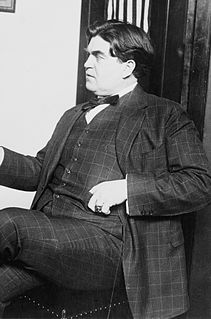A Quote by Paul Krugman
In short, what the living wage is really about is not living standards, or even economics, but morality. Its advocates are basically opposed to the idea that wages are a market price-determined by supply and demand, the same as the price of apples or coal. And it is for that reason, rather than the practical details, that the broader political movement of which the demand for a living wage is the leading edge is ultimately doomed to failure: For the amorality of the market economy is part of its essence, and cannot be legislated away.
Quote Topics
About
Amorality
Apples
Away
Basically
Broader
Cannot
Coal
Demand
Details
Determined
Doomed
Economics
Economy
Edge
Essence
Even
Failure
Idea
Leading
Living
Living Wage
Market
Market Economy
Morality
Movement
Opposed
Part
Political
Political Movement
Practical
Price
Rather
Really
Reason
Same
Short
Standards
Supply
Supply And Demand
Than
Ultimately
Wage
Wages
Which
Related Quotes
We stand for a living wage. Wages are subnormal if they fail to provide a living for those who devote their time and energy to industrial occupations. The monetary equivalent of a living wage varies according to local conditions, but must include enough to secure the elements of a normal standard of living-a standard high enough to make morality possible, to provide for education and recreation, to care for immature members of the family, to maintain the family during periods of sickness, and to permit of reasonable saving for old age.
I do believe that oil production globally has peaked at 85 million barrels. And I've been very vocal about it. And what happens? The demand continues to rise. The only way you can possibly kill demand is with price. So the price of oil, gasoline, has to go up to kill the demand. Otherwise, keep the price down, the demand rises.
This country pays a price whenever our economy fails to deliver rising living standards to our citizens - which is exactly what has been the case for years now. We pay a price when our political system cannot come together and agree on the difficult but necessary steps to rein in entitlement spending or reform our tax system.
If a market exists for low-paid work, then we should think about how we can make this type of work more attractive by providing government assistance. Of course, the wage-earner must be able to live off of his wages. We will not allow poverty wages or dumping wages. But the wage earner can receive a combined wage that includes both his actual wages and a government subsidy.
The great multinationals are unwilling to face the moral and economic contradictions of their own behavior - producing in low-wage dictatorships and selling to high-wage democracies. Indeed, the striking quality about global enterprises is how easily free-market capitalism puts aside its supposed values in order to do business. The conditions of human freedom do not matter to them so long as the market demand is robust. The absence of freedom, if anything, lends order and efficiency to their operations.
Four things have almost invariably followed the imposition of controls to keep prices below the level they would reach under supply and demand in a free market: (1) increased use of the product or service whose price is controlled, (2) Reduced supply of the same product or service, (3) quality deterioration, (4) black markets.



































